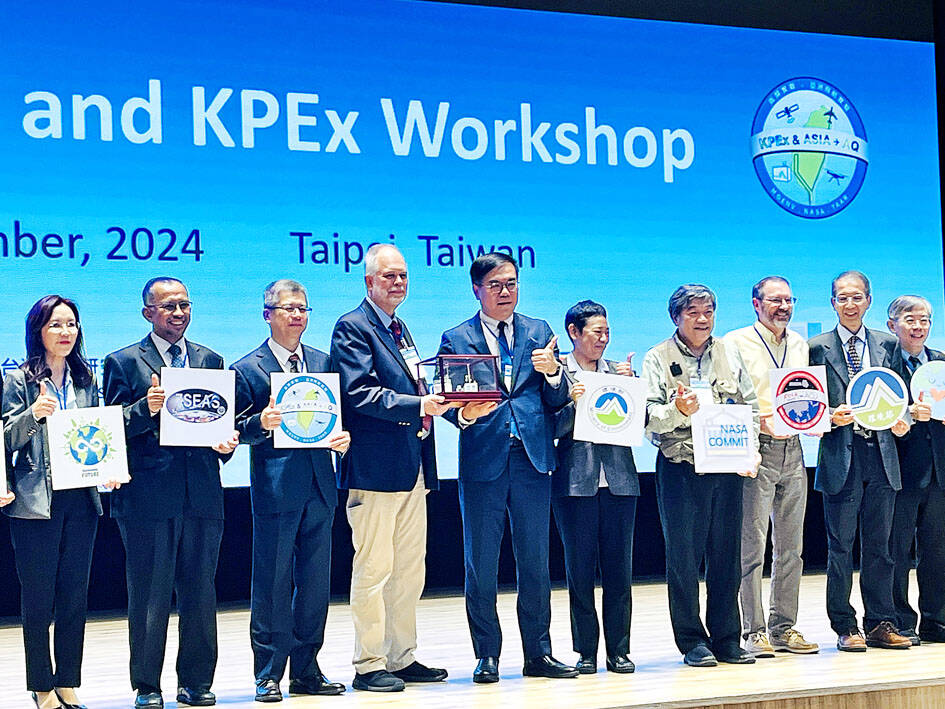Taiwan hopes to cooperate further with NASA on developing a satellite to monitor air quality, Minister of Environment Peng Chi-ming (彭啟明) said yesterday at the opening ceremony of a two-day workshop on cross-border air pollution hosted by the ministry in Taipei.
Hopefully collaboration with NASA would continue and the ministry and the Taiwan Space Agency (TASA) can launch a satellite to monitor air pollution, Peng said.
The data such a satellite could gather would play an important role regionally and globally to monitor air pollution and its spread, he said.

Photo: Chen Chia-yi, Taipei Times
The 2024 Seven Seas Program and Gaoping Experiment International Workshop is being attended by representatives from countries including South Korea, Thailand, Vietnam, Indonesia, Singapore, the Philippines, Malaysia and Bangladesh.
Taiwan has been collaborating with NASA and Asian countries on cross-border air pollution monitoring since the beginning of this year, the Ministry of Environment said.
From February to March, NASA research aircraft collected data over southern Taiwan four times as part of the 7-SEAS (South East Asian Studies) project studying climate interactions from Taiwan to Southeast Asia.
Results published yesterday showed that the air quality in southern Taiwan is a result of not only local pollution, but also highly affected by atmospheric circulation and transnational spread.
Taiwanese academics at the workshop shared 3D analyses of air pollution sources and pollutant concentrations in the Kaohsiung-Pingtung area based on the NASA data.
The research project would help Taiwan understand the distribution of ozone and volatile organic compounds, as well as how Taiwan’s topography affects their spread, said Lin Neng-huei (林能暉), a professor of atmospheric sciences at National Central University.
The research would provide more understanding about the effect of pollutants from foreign sources on Taiwan’s air quality, Lin said.
On March 13, pollution from abroad and a dust storm led to monitoring stations recording air quality levels three times higher than usual, he said, citing NASA’s data.
More than half of the pollution on that day could have come from abroad, he added.
Taiwan’s air quality is comparable to that of Japan and South Korea, while levels of harmful pollutants are much lower than in the other two nations, Peng said.
Unlicensed factories also contribute to pollution, meaning there is a need for increased monitoring and regulation, he said.
As pollution exists throughout the atmosphere and a large portion comes from abroad, it is necessary to work with other countries on this issue, he said.
Additional reporting by CNA

Chinese Nationalist Party (KMT) Chairman Eric Chu (朱立倫), spokeswoman Yang Chih-yu (楊智伃) and Legislator Hsieh Lung-chieh (謝龍介) would be summoned by police for questioning for leading an illegal assembly on Thursday evening last week, Minister of the Interior Liu Shyh-fang (劉世芳) said today. The three KMT officials led an assembly outside the Taipei City Prosecutors’ Office, a restricted area where public assembly is not allowed, protesting the questioning of several KMT staff and searches of KMT headquarters and offices in a recall petition forgery case. Chu, Yang and Hsieh are all suspected of contravening the Assembly and Parade Act (集會遊行法) by holding

PRAISE: Japanese visitor Takashi Kubota said the Taiwanese temple architecture images showcased in the AI Art Gallery were the most impressive displays he saw Taiwan does not have an official pavilion at the World Expo in Osaka, Japan, because of its diplomatic predicament, but the government-backed Tech World pavilion is drawing interest with its unique recreations of works by Taiwanese artists. The pavilion features an artificial intelligence (AI)-based art gallery showcasing works of famous Taiwanese artists from the Japanese colonial period using innovative technologies. Among its main simulated displays are Eastern gouache paintings by Chen Chin (陳進), Lin Yu-shan (林玉山) and Kuo Hsueh-hu (郭雪湖), who were the three young Taiwanese painters selected for the East Asian Painting exhibition in 1927. Gouache is a water-based

Taiwan would welcome the return of Honduras as a diplomatic ally if its next president decides to make such a move, Minister of Foreign Affairs Lin Chia-lung (林佳龍) said yesterday. “Of course, we would welcome Honduras if they want to restore diplomatic ties with Taiwan after their elections,” Lin said at a meeting of the legislature’s Foreign Affairs and National Defense Committee, when asked to comment on statements made by two of the three Honduran presidential candidates during the presidential campaign in the Central American country. Taiwan is paying close attention to the region as a whole in the wake of a

OFF-TARGET: More than 30,000 participants were expected to take part in the Games next month, but only 6,550 foreign and 19,400 Taiwanese athletes have registered Taipei city councilors yesterday blasted the organizers of next month’s World Masters Games over sudden timetable and venue changes, which they said have caused thousands of participants to back out of the international sporting event, among other organizational issues. They also cited visa delays and political interference by China as reasons many foreign athletes are requesting refunds for the event, to be held from May 17 to 30. Jointly organized by the Taipei and New Taipei City governments, the games have been rocked by numerous controversies since preparations began in 2020. Taipei City Councilor Lin Yen-feng (林延鳳) said yesterday that new measures by